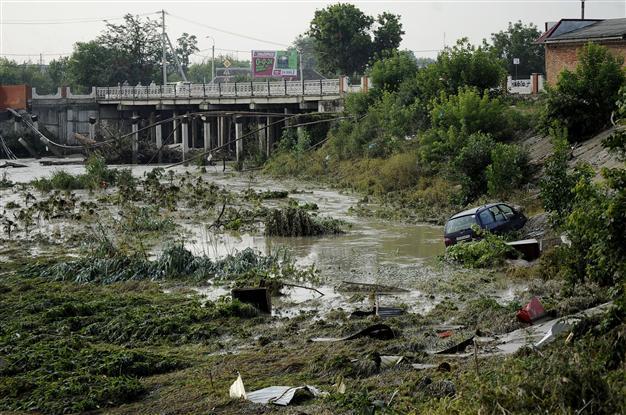Southern Russia reels from floods as toll climbs to 150
KRYMSK, Russia- Agence France-Presse

This picture taken on July 8, 2012 shows a general view of the flooded town of Krymsk. The death toll from severe flash floods in Russia's southern Krasnodar region climbed to 141 people from 134 overnight as officials discovered more bodies, a police spokesman said Sunday. AFP PHOTO / MIKHAIL MORDASOV
Russia on Sunday scrambled to deal with the aftermath of devastating flash floods that killed at least 150 people and swept away homes in the southern Krasnodar region's worst natural disaster in history.
Russian President Vladimir Putin personally inspected the worst-hit areas Saturday evening, the first major disaster since he came back to the Kremlin for a third term in May. Putin compared the force of the water, which trapped people in their homes at night, ripped up pavements and traffic lights and flooded rail tracks, to a "tsunami". He also quickly moved to address panicky speculation that the deluge was caused by an emergency opening of floodgates at a local reservoir, with the Kremlin issuing a statement that Putin had been told it was not the cause of the flooding.
At least 150 people died in the disaster, including in the port of Novorossiisk and the popular Black Sea resort town of Gelendzhik where five were electrocuted, a regional police spokeswoman in the city of Krasnodar told AFP.
The worst hit area was a district around Krymsk, a town of 57,000 where rescue teams have found 139 bodies including those of a one-year-old toddler and a 10-year-old child. Most of the victims were pensioners, many caught by the floods in their sleep.
Krymsk is about 200 kilometres (120 miles) northwest of the Black Sea resort of Sochi where Russia will host the 2014 Summer Olympic Games.
Flash floods frequently batter towns along the picturesque Black Sea coast during seasonal rains in the Caucasus mountains, but authorities say the current disaster is unprecedented.
Officials have been unable to explain the massive
death toll, saying only the floods were caused by torrential rains and caught many people unawares.
The force of the water was so ferocious that many residents said they suspected the floods were a man-made disaster caused by a release of water at a local reservoir on the Naberdzhai River.
In a bid to address persistent concerns, Putin, wearing a black shirt, was shown on television grilling officials about whether an emergency release of water was possible at the Naberdzhai reservoir.
"Where did the water come from?" Putin asked government officials in televised remarks.
Krasnodar Governor Alexander Tkachev swiftly replied: "It was raining." Investigators however acknowledged Sunday that repeated releases of water did happen but it remained unclear whether it might have contributed to the disaster.
"Over the course of 13 hours portioned releases of water were repeatedly conducted in an automated mode," spokesman for regional investigators Ivan Sengerov said in televised remarks.
"But there were not some large-scale water releases. We will have yet to establish how much they could have affected the development of events. It is too early to say whether this (the floods) was the consequence of these releases." Tkachev had earlier called on people to stop spreading "stupid rumours," saying on Twitter that the region received five months' worth of rain.
But some residents said they had no trust in the officials, accusing them of a cover-up.
"It always rains here but we've never had this before. A seven-metre tall wave crushed everything," Irina Morgunova told AFP in Krymsk. "That is not rain. But no-one will ever say it out loud." Putin said survivors would get new homes while families of victims would receive two million rubles ($60,800) each.
"The Krasnodar region is experiencing the most difficult and the most devastating floods in its history," the regional administration said, adding that the region would observe a day of mourning on Monday.
Krymsk residents complained Sunday that they have been left to their own devices and authorities offered no help.
"It's a catastrophe," said Viktor Voloshin, who arrived in the
flood-ravaged town earlier Sunday to help relatives whose house was damaged.
"People need drinking water but there is no drinking water being distributed," he told AFP.
He also said that people were afraid of leaving their houses for fear of looting even if their homes were destroyed.
"We have 30-degree weather now, diseases will begin," he added.
Pensioner Lidia Polinina said her elderly neighbour had died after becoming trapped by the flood waters.
"She was paralysed. She couldn't get out of the house," she told AFP.
Nearly 29,000 people remained without power across the region, the emergencies ministry said earlier Su
